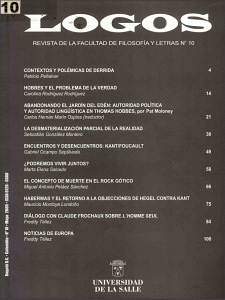Abstract
It is acceptable to state that Foucault has always held a strong stand and a radical distance in front of Kant’s thoughts. Similarly, it is possible thinking that through the changes of Foucault’s thoughts, the sceptical outlook suffered changes in relation with Kantian philosophical critique. Consequently, as said by Jon Simmons in his Foucault and the Political “it is ironic that a writer with a reputation for anarchist, nihilistic, even apocalyptic opposition to rationality, humanism and the Enlightment turned to Kant as a model for critique”. Despite the fact of trying to find a labelling reference for Foucault’s thought, that’s to say, where to put it?: modernity, post-modernity, anarchism, radical sceptical; the labelling duty would be very problematic; although the philosopher himself states that “if there is a need to label Foucault within the philosophical tradition, it is in Kant’s critical philosophical tradition and his stake (Foucault’s) would be named “a critique history of Western thought”. In fact, Foucault himself also writes that, “Every contemporary thought is, in certain way, neo-Kantian. In the same way, inquiries himself, “wasn’t Kant the one who said: one doesn’t learn philosophy, one learns how to philosophize?”Downloads
Download data is not yet available.



